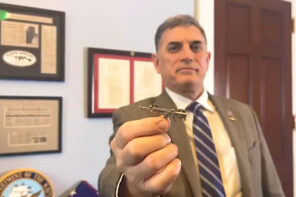So here we are again, after Newtown, after San Bernadino and Orlando. This time the rampage is in Las Vegas, with more dead, more people hospitalized, more deep trauma inflicted, but with the same shitty debate over prayer-vs-action and same despair over the potential for action being recycled.
There are some differences, of course. Rather than the NRA paying $3 million to elect a senator from Iowa, we now have a president elected with $30 million NRA dollars, and who perhaps not coincidentally “feels closer to the NRA than just about any outside group.” And instead of a Congress debating, however tentatively, gun control, we have a Republican-led House of Representatives considering rolling back limits on silencers and armor-piercing bullets.
I, like many others, worry about what’s becoming of our nation. I worry about what sort of world we’re leaving behind for our children. But just like in 2015, I remain skeptical, if not downright cynical, about the chances for meaningful gun reform being passed any time soon.
Kentucky Gov. Matt Bevin says “You can’t regulate evil,” which is true enough in the sense that it’s impossible to change the hearts of empathy-deprived bastards intent on doing harm to others. But evil is not some impersonal, external, arbitrary force: it is the product of human choice. You can’t regulate the evil of someone who wants to kill dozens. But you can choose to make it more difficult for him to accomplish it through simple, commonsense limits on gun ownership, such as banning “bump stocks,” taking guns out of the hands of those convicted of domestic abuse or other kinds of violence, and so on. It may not be possible to legislate away evil altogether, but governments can decide the extent to which they want to be complicit in it. That ought to go for “slow burn” gun violence as well, but sadly it does not.
If it were easy, of course, we’d already have gun reform. It isn’t and we don’t. In writing about Jimmy Kimmel’s monologue on the latest terrorist attack, Greg Sargent puts his finger on why not (emphasis his):
Kimmel nowhere fingered the Republican Party as the obstacle to action on this issue, instead aiming the blame at “congresspeople.” If you are Jimmy Kimmel, and you want more regulation of guns, the Republican Party is your problem. The Democratic Party has long supported and pushed for the very same solutions Kimmel called for last night. The GOP has blocked them.
As I said a few massacres back, guns aren’t a spiritual problem, they’re a partisan problem. Oh, American tolerance for gun violence reflects a screwed-up value system, to be sure. It’s just not the one you think. It’s not an issue of forming consensus around the need to regulate the availability of high-powered weaponry. As I pointed out in 2015, overwhelming majorities of Americans are in favor of these restrictions.
So it’s not that Americans don’t have their values in the right place. What holds back meaningful reform isn’t morality, it’s that some Americans are willing to ignore their morals in order to further their political ambitions by taking votes and money from people who don’t give a damn about how many people get killed by guns. What’s more, as Greg Sargent points out, those same people been able to exploit the weaknesses of American governance to make sure they don’t have to answer to the vast majority of voters on this issue. And it’s not all politicians who do this, but some of them, mostly and specifically Republican politicians.
I hate to be so cynical about this, but the truth of the matter is that calls for “moral resistance” to the American agenda of death will do exactly jack squat, no matter how well-intentioned. That’s not a criticism of those who try to summon ordinary people to action so much as it is to say they’re trying to solve the wrong problem.
It’s true, for example, that the SHARE act—that’s the noxious plan to expand the availability of silencers and armor-piercing bullets—has been put off. But that’s only a temporary matter of optics. SHARE will be back, and other ways of keeping America armed to the teeth will be introduced. No demonstration, no email petition, no call-in campaign to Congress will finally solve the problem of easy access to guns, because the political system is structured to prevent such a solution. The only way to change the depraved American situation will be to change its depraved political system, and that will require a change in who controls that system.
Maybe Matt Bevin is right. Maybe you can’t regulate evil. But you can vote those who abide it out of office. In fact, that’s exactly what has to happen. What I said in 2015 still holds today, I think:
Religious advocates for gun control are caught on the horns of a dilemma, then. They can live their values and not get involved in the dirty business of politics, in which case the slaughter continues. Or they can come off the sidelines and start to organize effectively, which challenges the cherished belief that faith-based action can somehow rise above mere politics. Reinhold Niebuhr pegged this problem right: no option for response is morally pure—and oh, by the way, doing nothing is just another option.
Every faith-based activist and every high-minded proponent of civil religion needs to start wrestling with this reality, if we are to avoid being right back here again, only with a higher body count.





